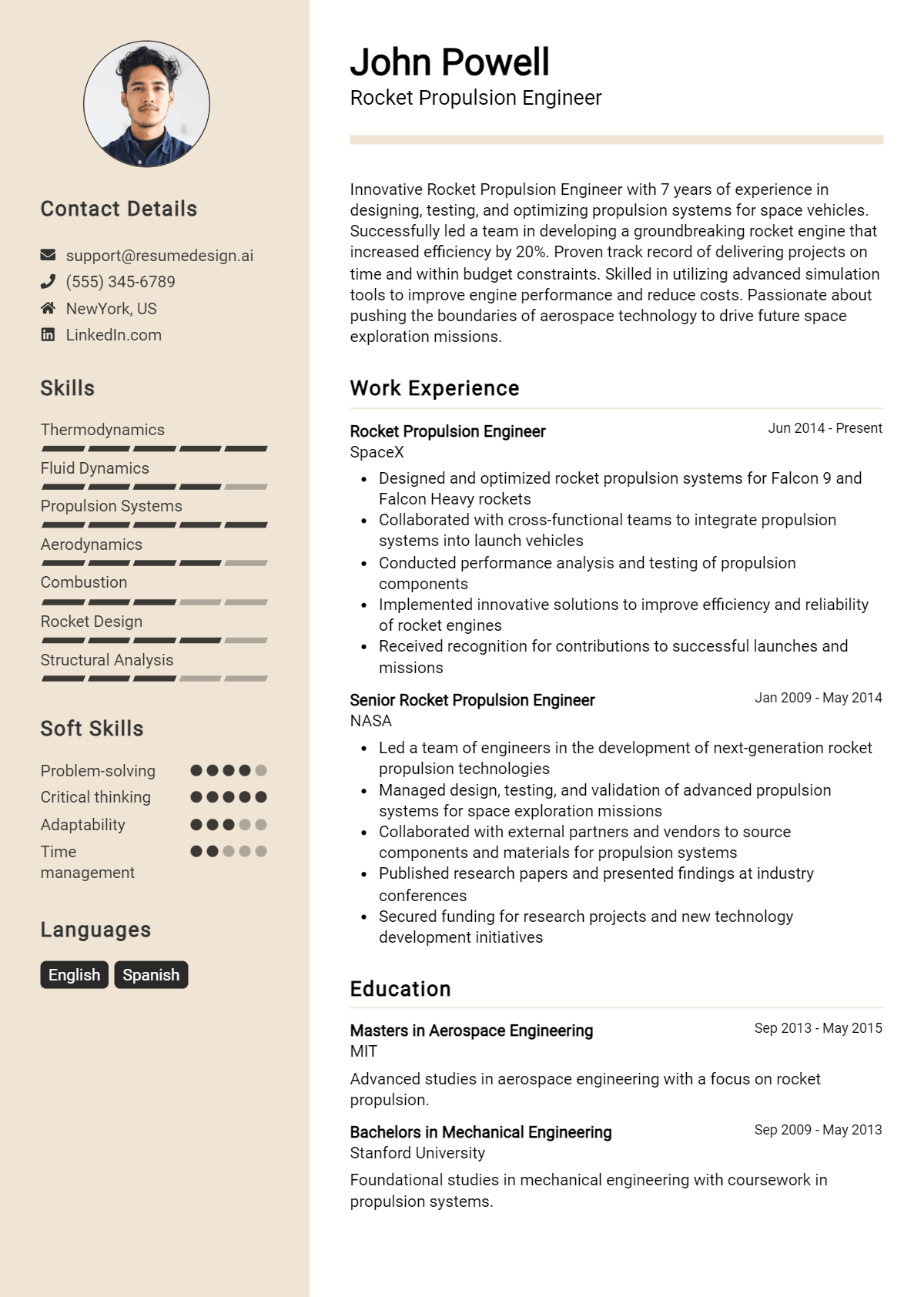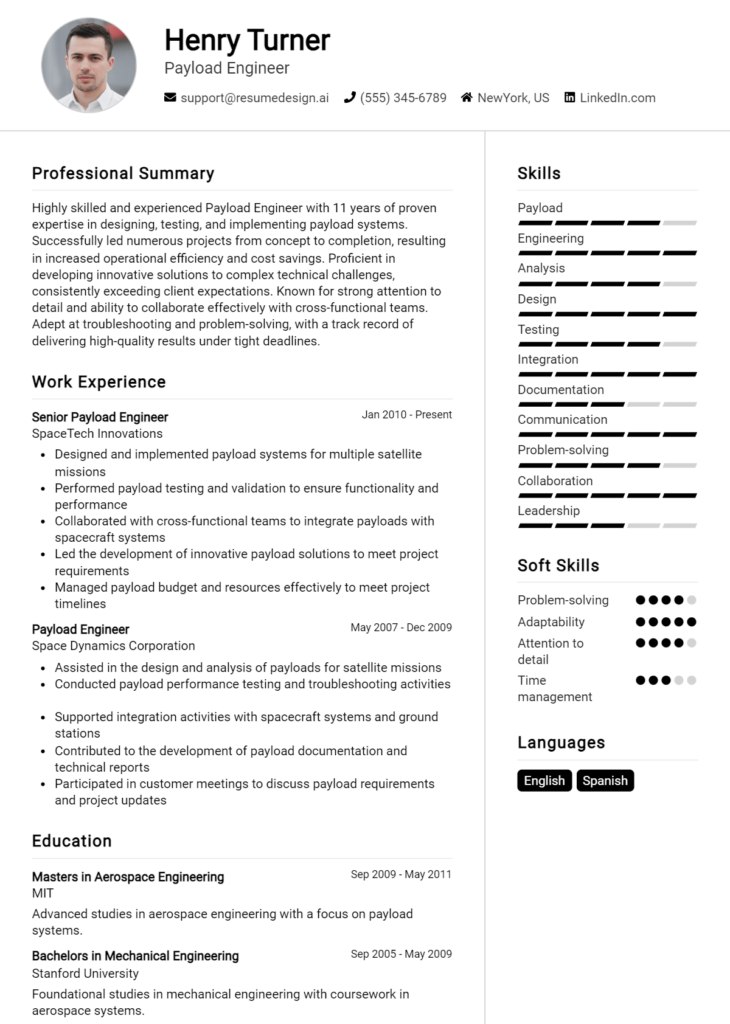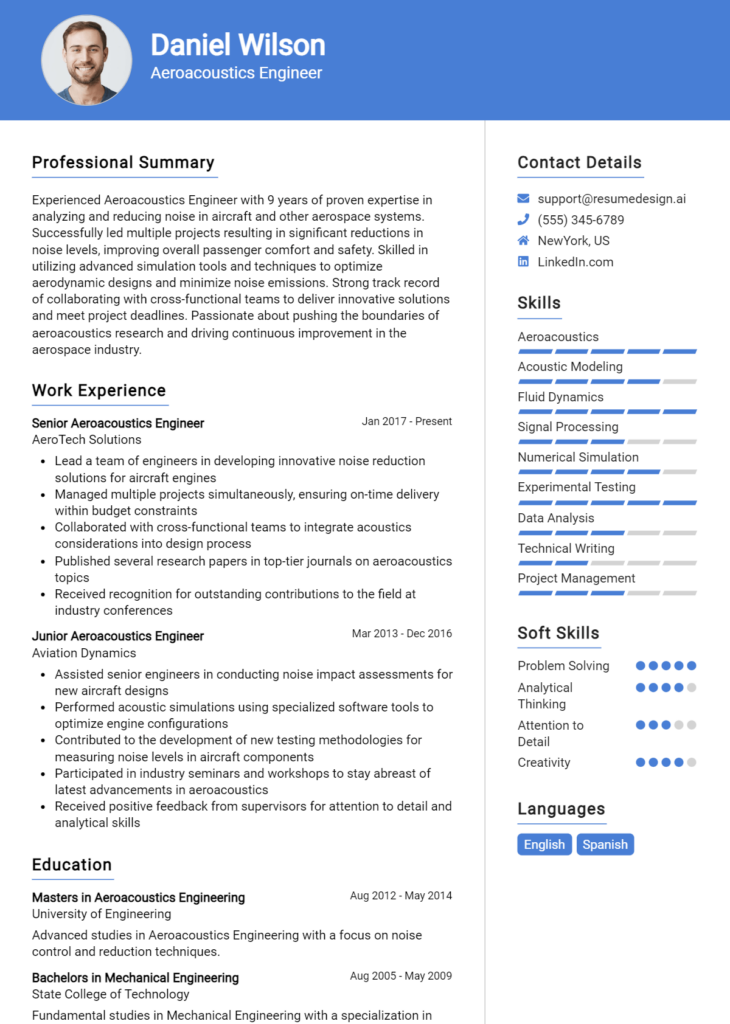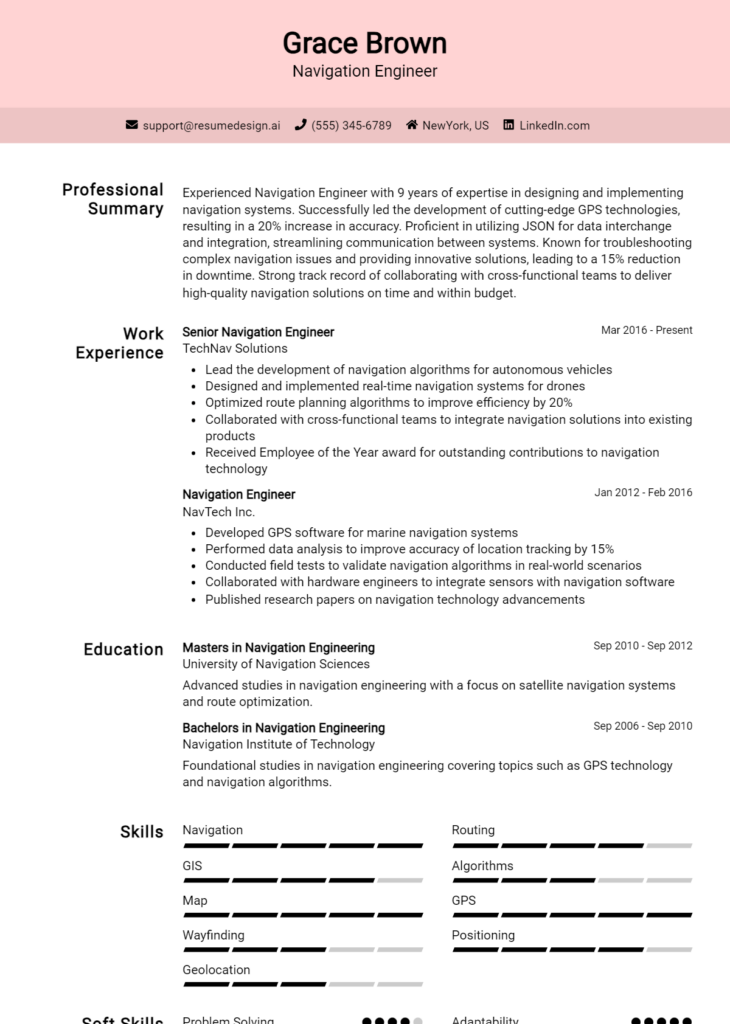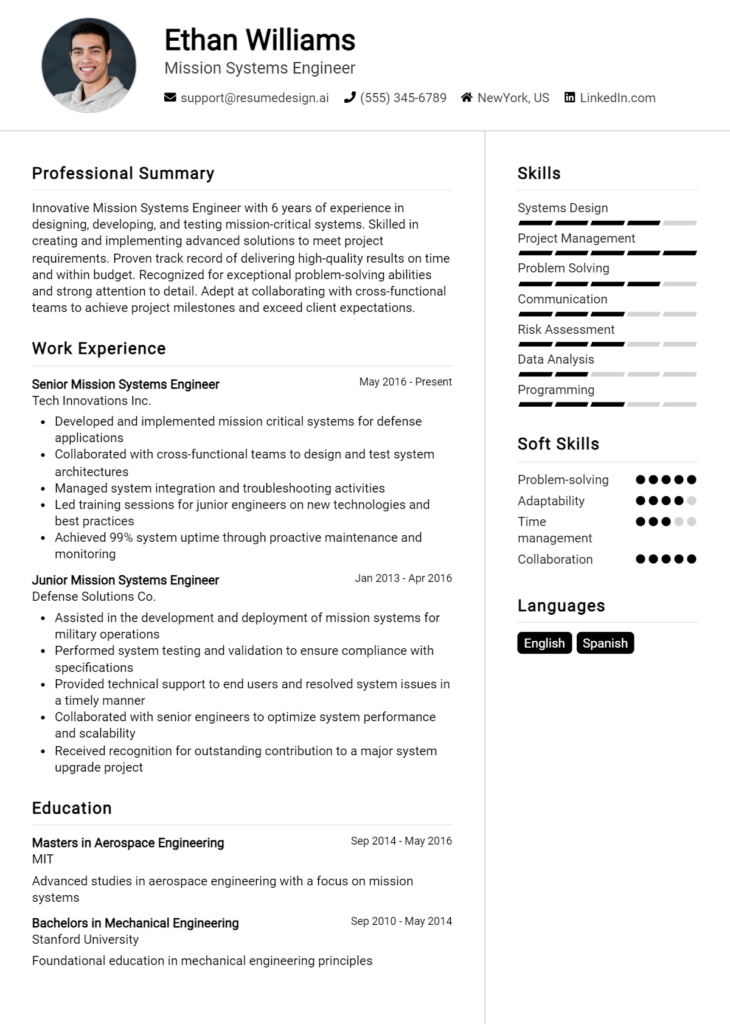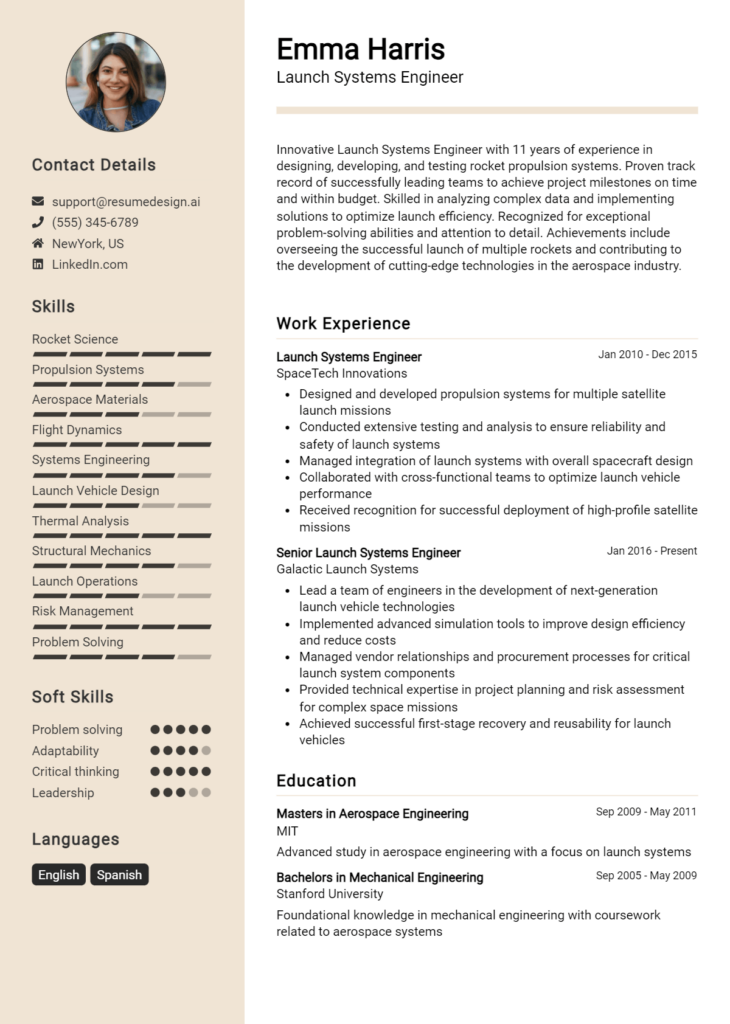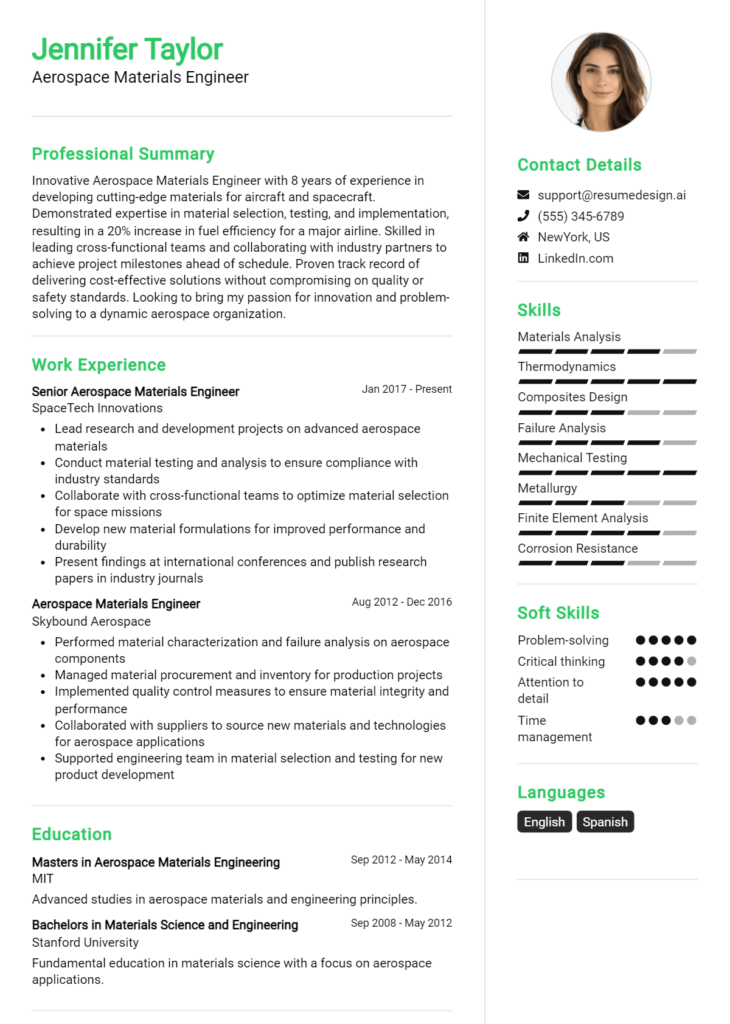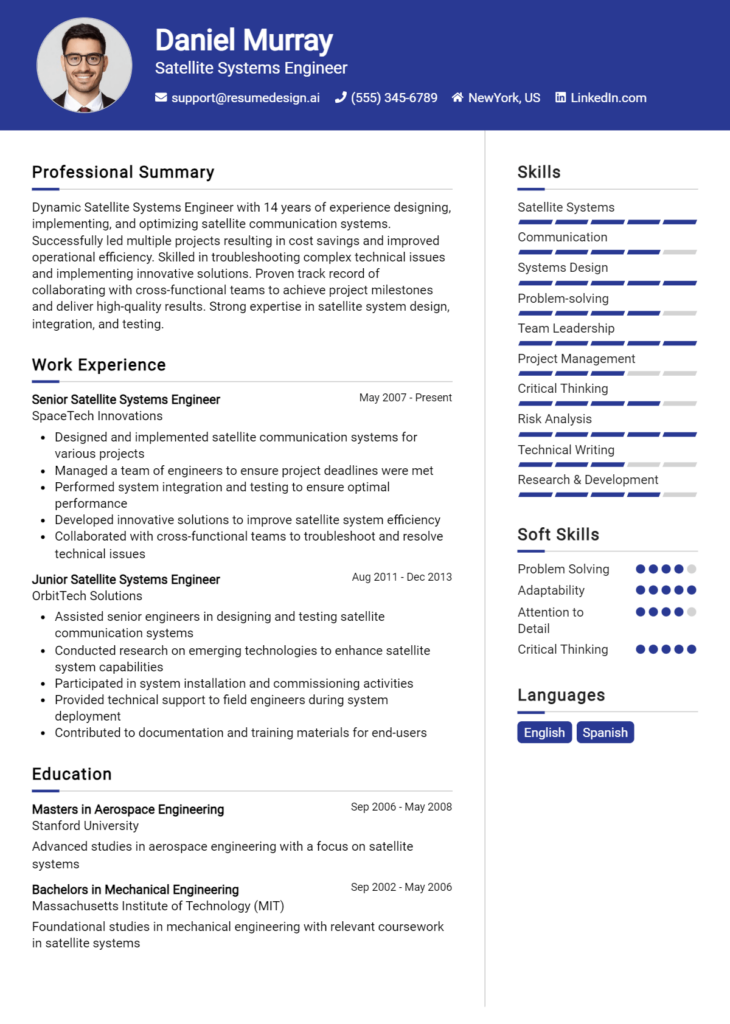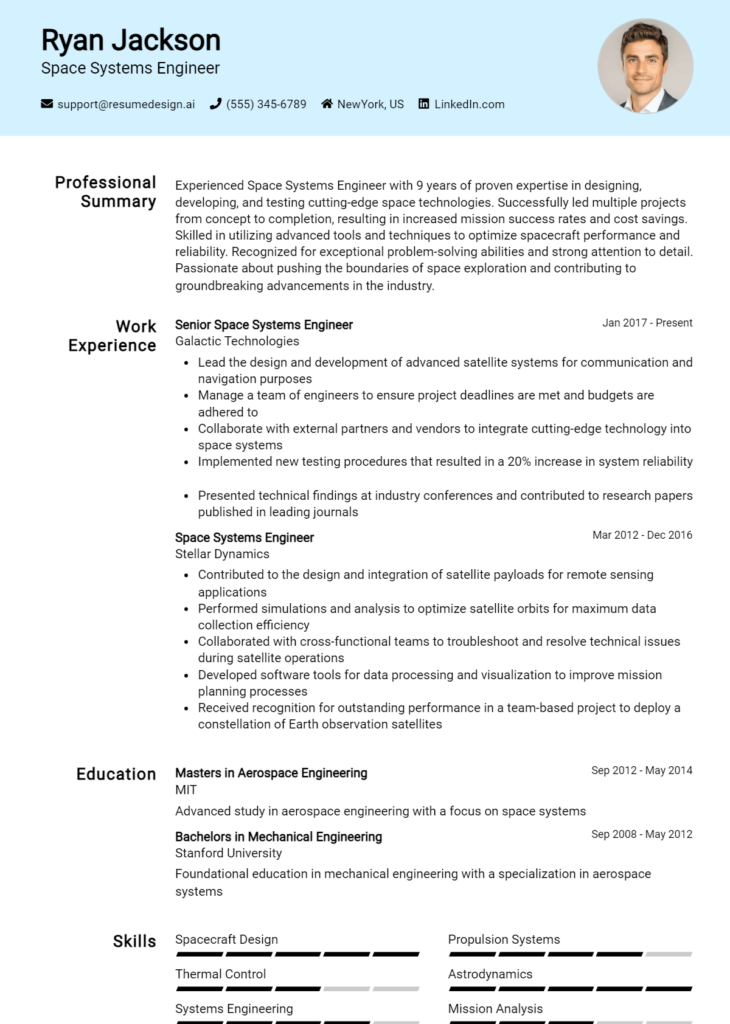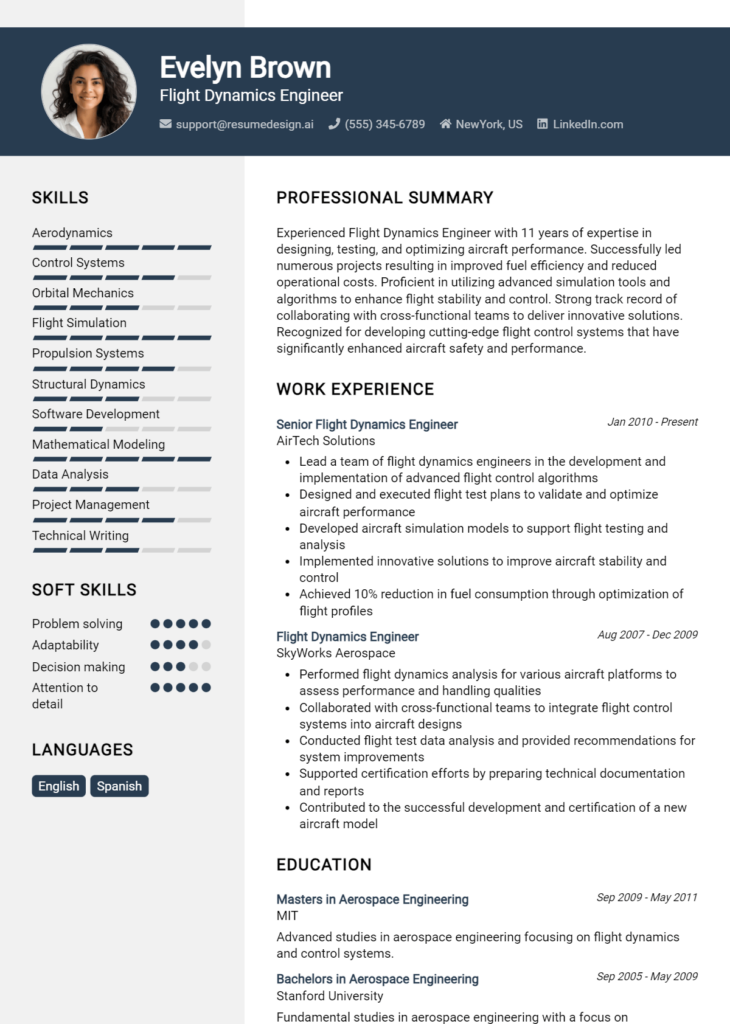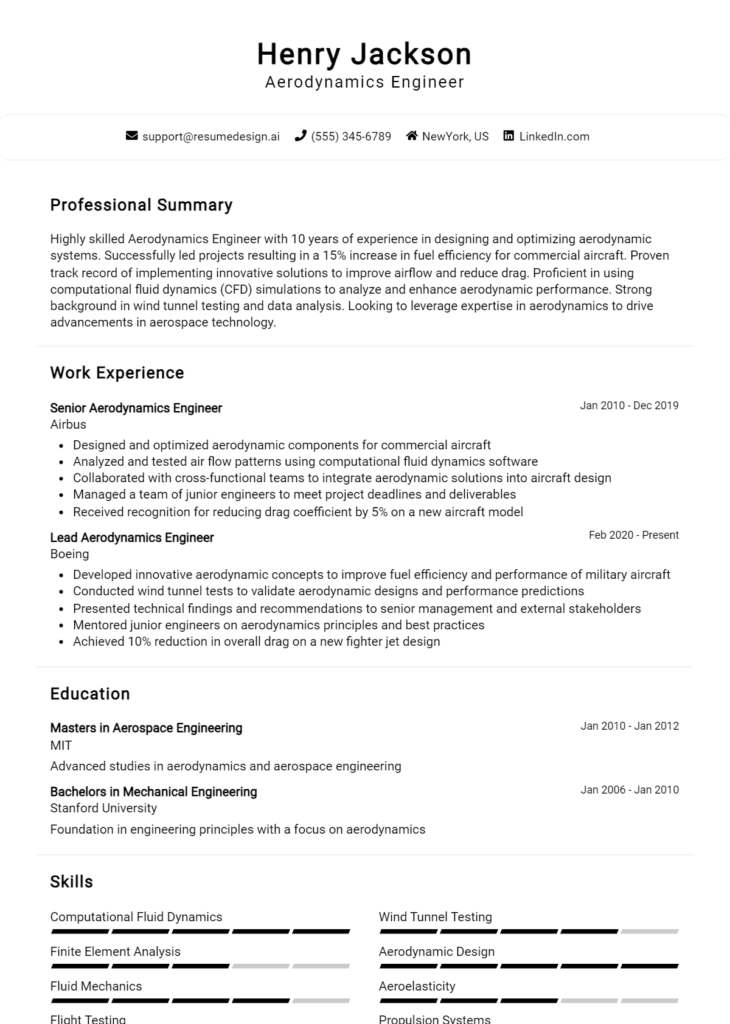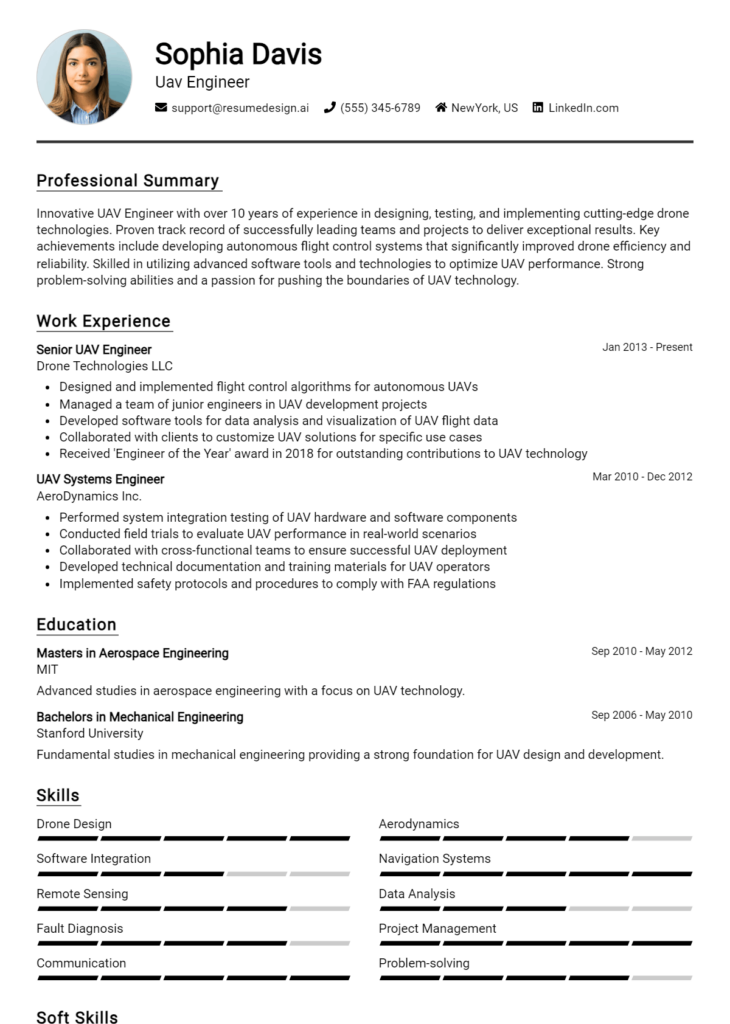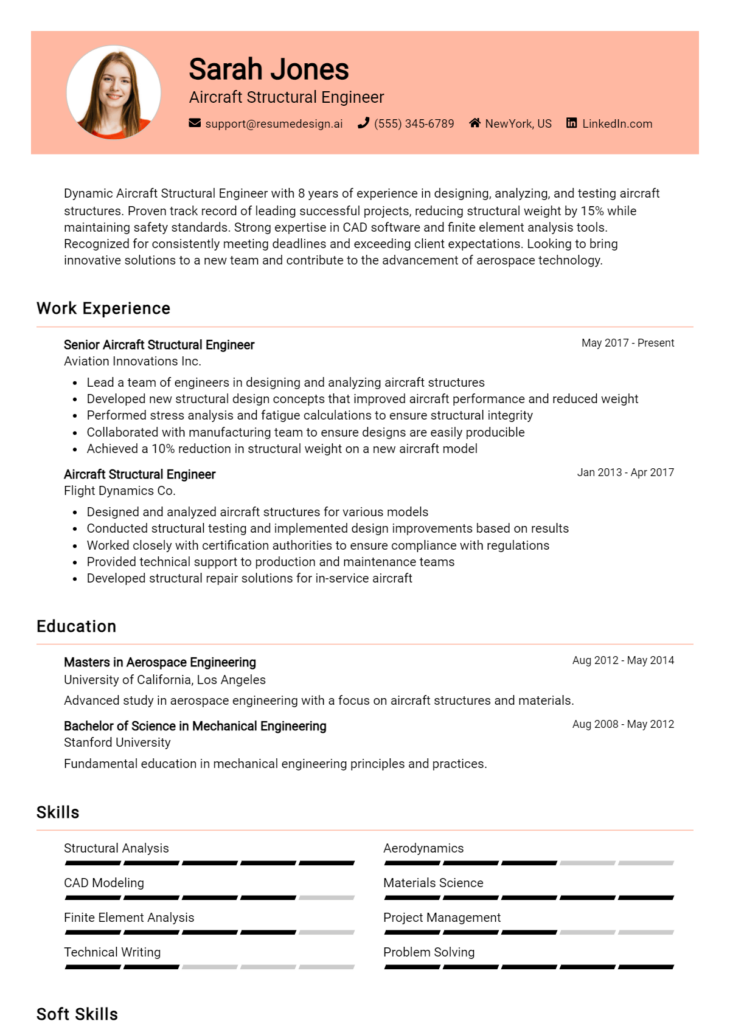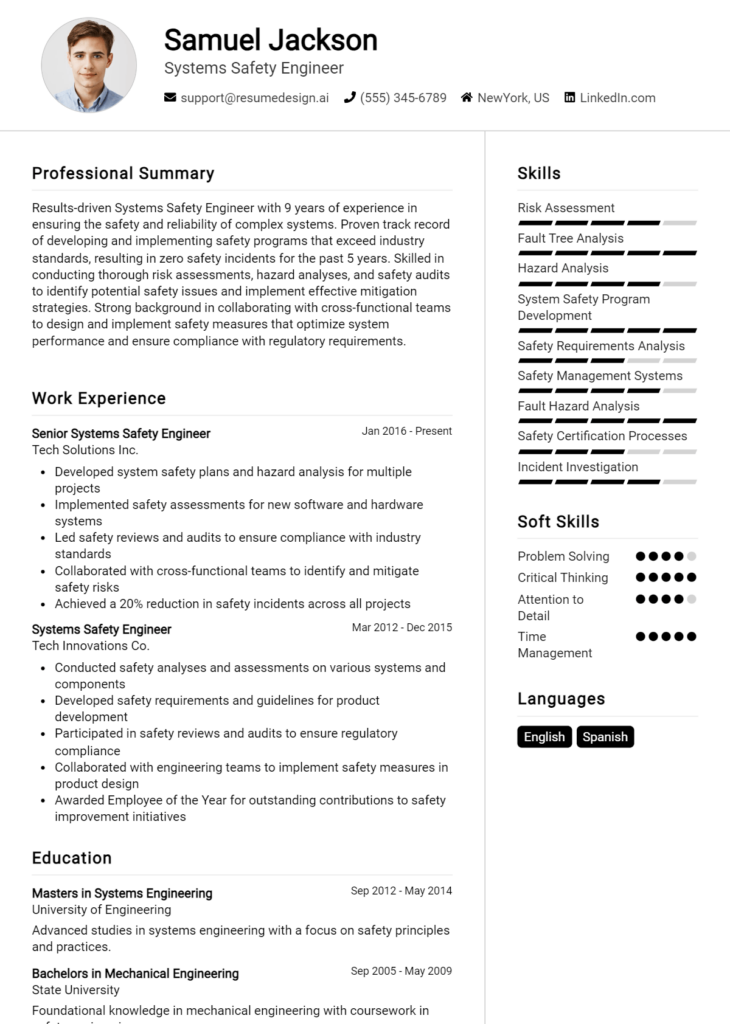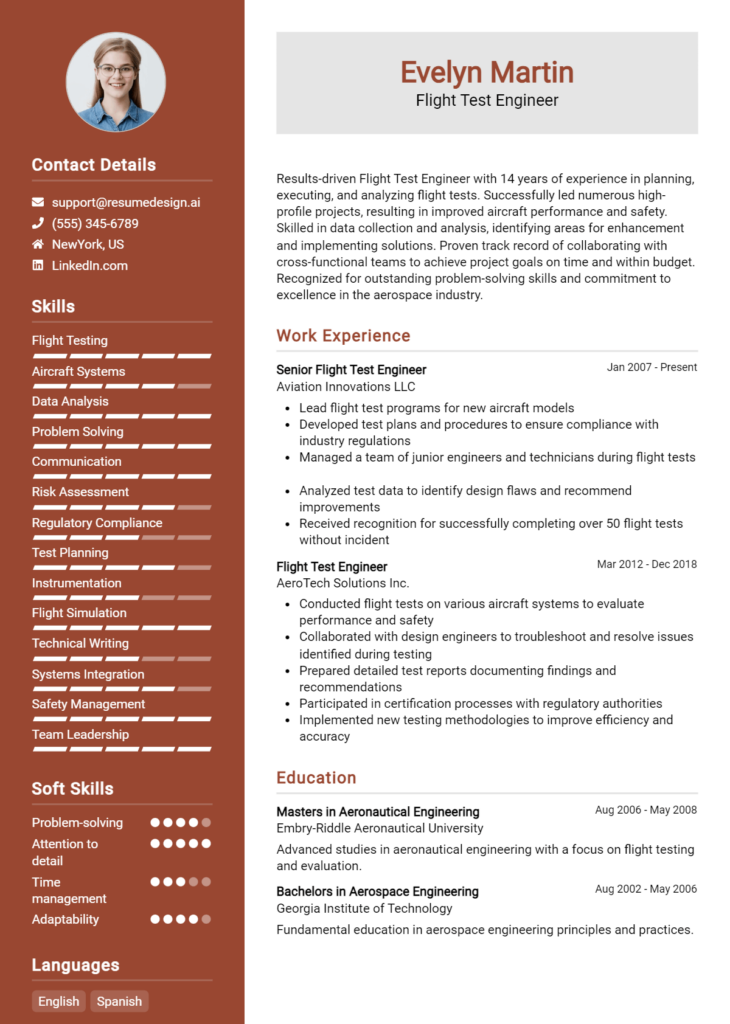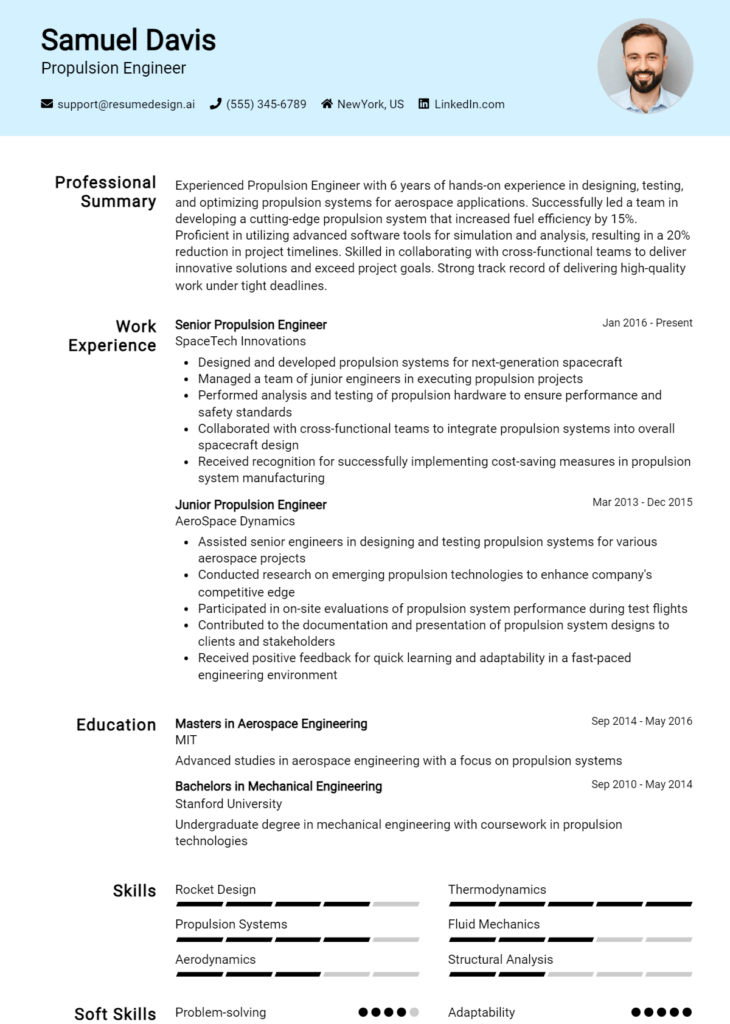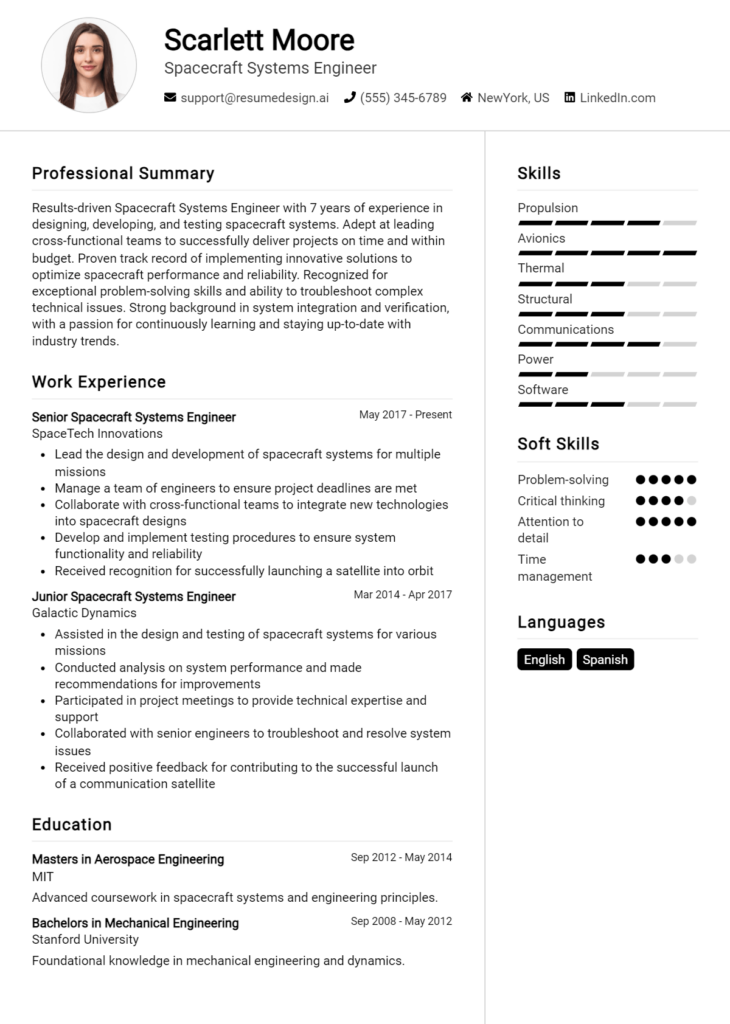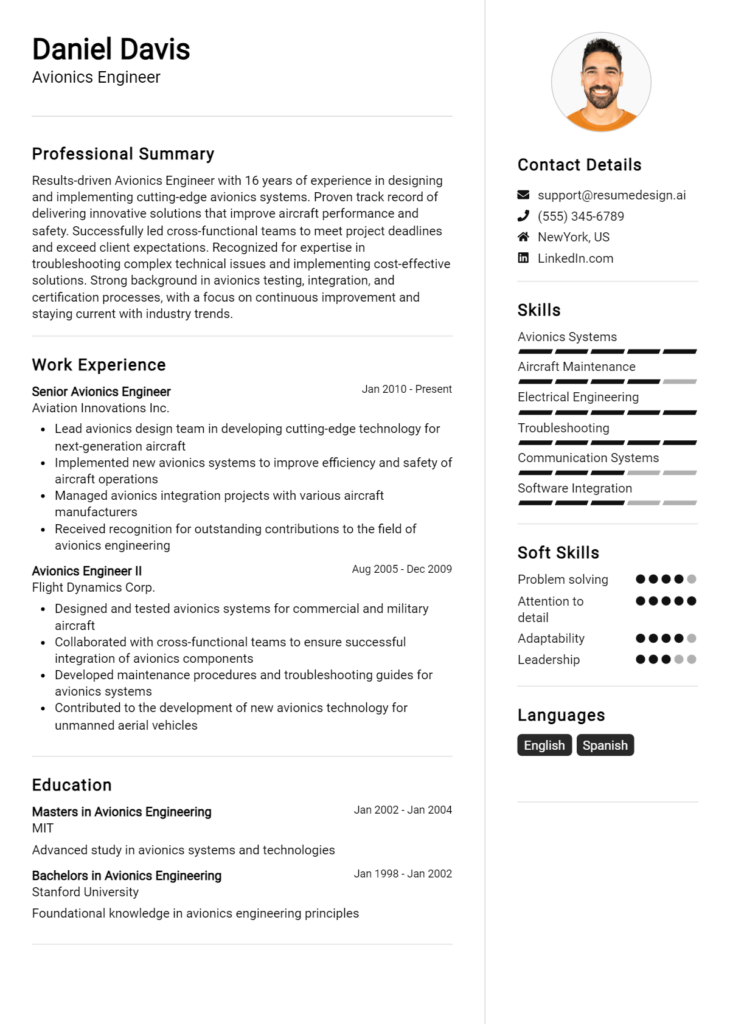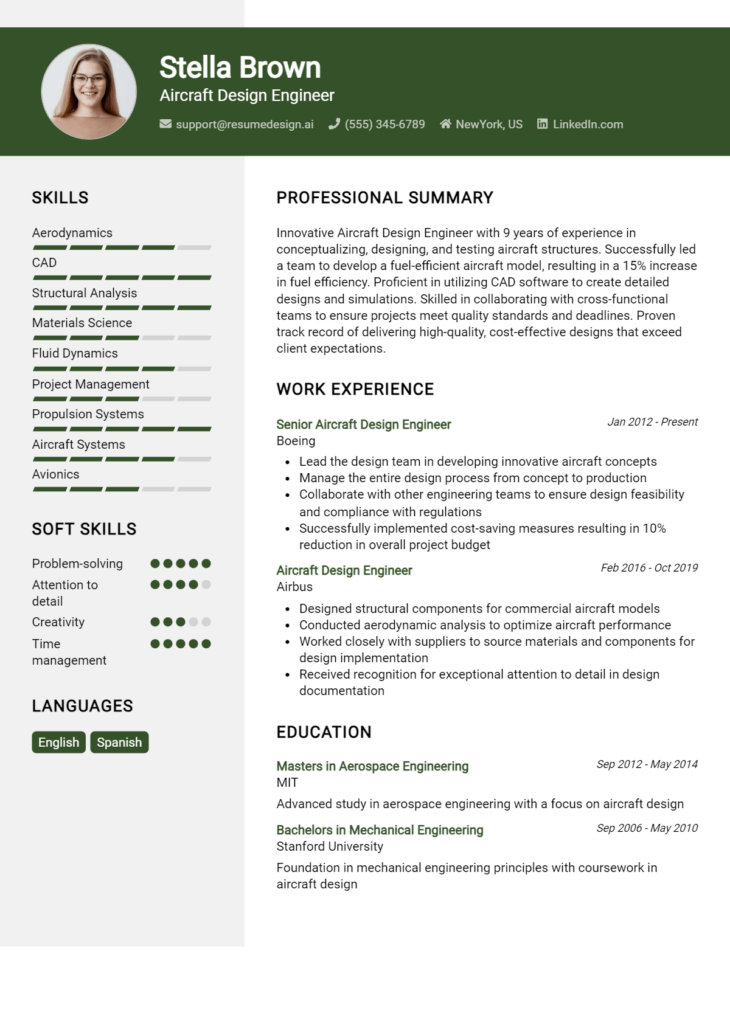Rocket Propulsion Engineer Core Responsibilities
A Rocket Propulsion Engineer plays a crucial role in the design, development, and testing of propulsion systems for rockets and spacecraft. This position requires strong technical skills in fluid dynamics, thermodynamics, and materials science, along with operational expertise in testing and analysis. The engineer must effectively collaborate across departments such as manufacturing, systems engineering, and quality assurance, addressing complex problems that arise during project development. A well-structured resume can highlight these qualifications, demonstrating how they align with the organization's goals and contribute to successful missions.
Common Responsibilities Listed on Rocket Propulsion Engineer Resume
- Design and analyze propulsion systems for launch vehicles and spacecraft.
- Conduct performance testing and evaluation of rocket engines.
- Collaborate with cross-functional teams to integrate propulsion systems.
- Develop and implement test plans for engine performance and reliability.
- Utilize computational fluid dynamics (CFD) for system modeling.
- Conduct failure analysis and troubleshooting of propulsion components.
- Ensure compliance with safety and regulatory standards.
- Document test results and prepare technical reports for stakeholders.
- Participate in design reviews and provide engineering support.
- Continuously research and innovate new propulsion technologies.
- Assist in the preparation of project budgets and timelines.
- Mentor junior engineers and provide technical guidance.
High-Level Resume Tips for Rocket Propulsion Engineer Professionals
In the highly specialized field of rocket propulsion engineering, a well-crafted resume is not just a document; it is your first chance to make a lasting impression on potential employers. With the competitive nature of this industry, your resume must effectively encapsulate your skills, achievements, and unique experiences. It serves as a powerful marketing tool that showcases your technical expertise and problem-solving capabilities. This guide will provide practical and actionable resume tips specifically tailored for Rocket Propulsion Engineer professionals, ensuring that your application stands out in a crowded job market.
Top Resume Tips for Rocket Propulsion Engineer Professionals
- Tailor your resume to match the job description by using relevant keywords and phrases that align with the specific requirements of the position.
- Highlight your technical skills, such as fluid dynamics, thermodynamics, and propulsion system design, as these are crucial for the role.
- Showcase relevant experience by detailing projects you've worked on, including internships, research, or any hands-on work related to rocket propulsion.
- Quantify your achievements with specific metrics, such as performance improvements, cost savings, or successful launches, to demonstrate the impact of your work.
- Include a section for certifications and continuing education that are pertinent to aerospace engineering and propulsion technologies.
- Utilize a clean, professional format that enhances readability and allows your key accomplishments to shine through.
- Incorporate a summary or objective statement that clearly articulates your career goals and what you bring to the organization.
- Showcase your teamwork and collaboration skills, as rocket propulsion engineering often involves working in multidisciplinary teams.
- Include any publications, patents, or presentations that highlight your contributions to the field and your commitment to advancing rocket propulsion technology.
By implementing these tips, you can significantly increase your chances of landing a job in the Rocket Propulsion Engineer field. A polished and focused resume not only demonstrates your qualifications but also reflects your dedication to the profession, making you a compelling candidate in the eyes of potential employers.
Why Resume Headlines & Titles are Important for Rocket Propulsion Engineer
In the highly specialized field of rocket propulsion engineering, a well-crafted resume headline or title is paramount. It serves as the first impression for hiring managers and can significantly influence their decision to read further. A strong headline succinctly encapsulates a candidate's key qualifications, making it easier for employers to quickly assess suitability for the role. By being concise, relevant, and directly related to the job at hand, these headlines not only grab attention but also set the tone for the entire resume, ensuring that the candidate stands out in a competitive job market.
Best Practices for Crafting Resume Headlines for Rocket Propulsion Engineer
- Keep it concise: Aim for a single impactful phrase that summarizes your qualifications.
- Be role-specific: Tailor the headline to reflect the specific position of Rocket Propulsion Engineer.
- Highlight key skills: Include technical skills or expertise relevant to rocket propulsion.
- Showcase accomplishments: If possible, reference significant achievements or contributions in previous roles.
- Use industry keywords: Incorporate terminology that aligns with the job description to enhance visibility.
- Avoid jargon: Ensure clarity by using straightforward language that can be easily understood.
- Consider your audience: Think about what hiring managers in aerospace and propulsion engineering value most.
- Revise for impact: Regularly update your headline to reflect your most current and relevant experiences.
Example Resume Headlines for Rocket Propulsion Engineer
Strong Resume Headlines
Dynamic Rocket Propulsion Engineer with 8+ Years in Advanced Propulsion Systems
Innovative Aerospace Engineer Specializing in Rocket Engine Design and Optimization
Results-Driven Propulsion Engineer with Proven Track Record of Successful Launches
Weak Resume Headlines
Engineer Looking for Work
Rocket Scientist with Experience
The strong headlines are effective because they provide specific information about the candidate's experience and skills, immediately conveying their value to potential employers. They are tailored to the role and highlight relevant achievements, making them memorable and impactful. In contrast, the weak headlines fail to impress as they are vague and lack detail, offering no clear indication of the candidate's qualifications or suitability for the position. As a result, they do not capture the attention of hiring managers who are looking for distinct and relevant expertise in rocket propulsion engineering.
Writing an Exceptional Rocket Propulsion Engineer Resume Summary
A well-crafted resume summary is crucial for a Rocket Propulsion Engineer as it serves as the first impression to hiring managers. This brief yet impactful section quickly captures attention by succinctly showcasing the candidate's key skills, relevant experience, and notable accomplishments in the field of rocket propulsion. A strong summary should highlight specialized knowledge in areas such as propulsion systems, fluid dynamics, or thermodynamics, while being concise and tailored to the specific job description. This targeted approach not only enhances the candidate's visibility but also positions them as a qualified contender for the role.
Best Practices for Writing a Rocket Propulsion Engineer Resume Summary
- Quantify achievements: Use numbers to illustrate your accomplishments and impact in previous roles.
- Focus on relevant skills: Highlight technical skills and expertise that align with the job description.
- Tailor the summary: Customize the summary for each application to reflect the specific requirements of the job.
- Be concise: Aim for 2-4 sentences that convey your qualifications without unnecessary fluff.
- Use action verbs: Start sentences with strong action verbs to convey confidence and proactivity.
- Showcase problem-solving abilities: Highlight how your skills have been used to overcome challenges in past projects.
- Include industry-specific terminology: Use jargon that reflects your knowledge of the field and resonates with hiring managers.
- Demonstrate passion: Convey enthusiasm for rocket propulsion and the impact of your work in the aerospace industry.
Example Rocket Propulsion Engineer Resume Summaries
Strong Resume Summaries
Dynamic Rocket Propulsion Engineer with over 7 years of experience in developing innovative propulsion systems for launch vehicles. Successfully led a team that improved engine efficiency by 15%, resulting in a $1.2 million cost reduction in operational expenses.
Results-driven aerospace engineer specializing in liquid propulsion systems. Engineered a cutting-edge thrust vector control mechanism that enhanced maneuverability and reduced fuel consumption by 20% during test flights.
Detail-oriented Rocket Propulsion Engineer with a proven track record in simulation and testing of propulsion systems. Achieved a 30% increase in test accuracy through the implementation of advanced computational fluid dynamics (CFD) techniques.
Weak Resume Summaries
Experienced engineer with a background in propulsion. Worked on various projects in the aerospace field.
Passionate about rocket propulsion and looking for a challenging position in engineering.
The strong resume summaries are considered effective because they provide specific details about the candidate's accomplishments, quantifying their impact and relevance to the role. They demonstrate a clear understanding of the industry's technical requirements and articulate how the candidate's skills meet those needs. In contrast, the weak summaries lack detail and specificity, failing to convey the candidate's unique qualifications or measurable contributions, making them less compelling for hiring managers.
Work Experience Section for Rocket Propulsion Engineer Resume
The work experience section of a Rocket Propulsion Engineer resume is vital as it demonstrates the candidate's technical skills, proficiency in managing teams, and capability to deliver high-quality products. This section allows prospective employers to gauge how well a candidate's background aligns with industry standards. By quantifying achievements and clearly articulating responsibilities, candidates can effectively showcase their impact within previous roles, making a compelling case for their expertise in propulsion systems and rocket design.
Best Practices for Rocket Propulsion Engineer Work Experience
- Highlight specific technical skills relevant to rocket propulsion and aerospace engineering.
- Quantify achievements with metrics, such as performance improvements, cost savings, or project timelines.
- Emphasize leadership roles and team management experience in projects.
- Align your experience with industry standards and technologies currently in use.
- Use action verbs to convey impact and contribution to projects.
- Include collaborative projects that demonstrate teamwork and interdisciplinary communication.
- Showcase problem-solving skills by detailing challenges faced and solutions implemented.
- Tailor the work experience section to match the job description of the position you are applying for.
Example Work Experiences for Rocket Propulsion Engineer
Strong Experiences
- Led a team of 8 engineers in the development of a new propulsion system that increased thrust by 15% while reducing fuel consumption by 10%.
- Managed a project with a $2 million budget to design and test rocket engines, achieving successful test results ahead of schedule by 3 months.
- Collaborated with cross-functional teams to implement advanced simulation techniques, resulting in a 20% reduction in design iterations.
- Developed a safety protocol for engine testing that decreased incident reports by 40% over two years.
Weak Experiences
- Worked on various projects related to rocket engines.
- Assisted in the design and testing of propulsion systems.
- Participated in team meetings and contributed ideas.
- Helped maintain equipment used in propulsion tests.
The examples listed as strong experiences are considered effective because they provide specific, quantifiable outcomes and demonstrate leadership and collaboration in significant projects. They highlight the candidate's direct impact on performance and safety, showcasing their expertise. In contrast, the weak experiences lack detail, specificity, and measurable achievements, making it difficult for potential employers to understand the candidate's contributions and capabilities.
Education and Certifications Section for Rocket Propulsion Engineer Resume
The education and certifications section of a Rocket Propulsion Engineer resume is crucial as it serves to underscore the candidate's academic qualifications and their commitment to continuous professional development in a highly specialized field. This section not only highlights the foundational knowledge acquired through relevant degrees but also showcases industry-recognized certifications and specialized training that enhance the candidate's skill set. By including pertinent coursework and certifications, the candidate can significantly bolster their credibility and demonstrate alignment with the technical demands of the role, making a compelling case to potential employers.
Best Practices for Rocket Propulsion Engineer Education and Certifications
- Focus on degrees relevant to aerospace engineering, mechanical engineering, or related fields.
- Include industry-recognized certifications, such as those from the American Institute of Aeronautics and Astronautics (AIAA) or other reputable organizations.
- Highlight advanced degrees (Master’s or Ph.D.) that demonstrate higher levels of expertise.
- Detail relevant coursework that directly pertains to propulsion systems, fluid dynamics, and thermodynamics.
- Emphasize any specialized training in propulsion technologies or software tools used in the industry.
- Keep the information current; avoid listing outdated certifications or degrees that no longer hold relevance.
- Use clear formatting to make the section easy to read and navigate for hiring managers.
- Tailor the section to match the job description, focusing on qualifications that the employer specifically seeks.
Example Education and Certifications for Rocket Propulsion Engineer
Strong Examples
- Master of Science in Aerospace Engineering, University of California, Los Angeles (UCLA), 2020
- Certified Propulsion Engineer (CPE) from the American Institute of Aeronautics and Astronautics (AIAA), 2021
- Relevant Coursework: Advanced Propulsion Systems, Computational Fluid Dynamics, Rocket Propulsion Design
- Professional Development: Completed training on SolidWorks and ANSYS for propulsion modeling, 2022
Weak Examples
- Bachelor of Arts in English Literature, University of Texas, 2018
- Certification in Microsoft Office Suite, 2019
- Relevant Coursework: Introduction to Psychology
- Attended a workshop on Resume Writing in 2020
The examples provided above are considered strong because they directly relate to the field of rocket propulsion engineering, showcasing relevant degrees, certifications, and coursework that align with the job requirements. In contrast, the weak examples highlight qualifications that are unrelated or outdated, failing to demonstrate the necessary expertise and specialization required for a Rocket Propulsion Engineer role. This distinction underscores the importance of selecting the right educational background and certifications to enhance credibility in the eyes of potential employers.
Top Skills & Keywords for Rocket Propulsion Engineer Resume
As a Rocket Propulsion Engineer, possessing the right skills is crucial to not only land a job but also to excel in a field that combines complexity, innovation, and precision. Employers seek candidates who can demonstrate both technical know-how and interpersonal abilities, making it imperative to carefully curate a resume that highlights these competencies. A well-structured resume featuring relevant skills can set you apart from other candidates and showcase your potential to contribute effectively to aerospace projects. Whether it's through hands-on experience or theoretical knowledge, showcasing a blend of both hard and soft skills can significantly enhance your chances of success in this competitive industry.
Top Hard & Soft Skills for Rocket Propulsion Engineer
Soft Skills
- Team Collaboration
- Problem-Solving
- Critical Thinking
- Communication Skills
- Attention to Detail
- Time Management
- Adaptability
- Creativity
- Leadership
- Conflict Resolution
- Initiative
Hard Skills
- Propulsion System Design
- Fluid Dynamics
- Thermodynamics
- Rocket Propellant Chemistry
- Computer-Aided Design (CAD)
- Finite Element Analysis (FEA)
- MATLAB Programming
- Test and Measurement Techniques
- Aerospace Materials Knowledge
- Systems Engineering Principles
- Performance Analysis
- Simulation Software Proficiency
- Project Management
- Compliance with Safety Standards
For a deeper dive into the necessary skills and how to effectively outline your work experience, consider evaluating the latest industry trends and job descriptions to tailor your resume accordingly.
Stand Out with a Winning Rocket Propulsion Engineer Cover Letter
Dear [Hiring Manager's Name],
I am writing to express my enthusiasm for the Rocket Propulsion Engineer position at [Company Name], as advertised on [Job Board/Company Website]. With a Master’s degree in Aerospace Engineering from [University Name] and over [X years] of hands-on experience in propulsion system design and analysis, I am excited about the opportunity to contribute to your innovative projects. My background in both theoretical and practical aspects of rocket propulsion, coupled with my passion for space exploration, makes me a perfect fit for your team.
In my previous role at [Previous Company Name], I successfully led a team to design and test a new hybrid rocket engine, which not only improved thrust efficiency by 20% but also reduced overall manufacturing costs. I developed advanced simulation models to predict performance under various conditions, ensuring that our designs met rigorous safety and reliability standards. My proficiency in tools such as MATLAB, ANSYS, and SolidWorks allowed me to optimize both liquid and solid propulsion systems, which resulted in significant project advancements and accolades from senior management. I am particularly drawn to [Company Name] because of your commitment to pioneering sustainable rocket technology, and I am eager to bring my expertise in propulsion systems to help achieve your ambitious goals.
Collaboration and communication are essential in the multidisciplinary field of aerospace engineering, and I pride myself on my ability to work effectively with cross-functional teams. At [Previous Company Name], I regularly collaborated with mechanical, electrical, and software engineers to integrate propulsion systems with vehicle designs, ensuring seamless operation. I believe my proactive approach to problem-solving and my dedication to continuous learning will allow me to contribute positively to the culture of innovation at [Company Name]. I am excited about the possibility of discussing how my skills and experiences align with the needs of your team.
Thank you for considering my application. I look forward to the opportunity to discuss my candidacy further and share how I can contribute to the exciting projects at [Company Name]. Please feel free to contact me at [Your Phone Number] or [Your Email Address] to schedule a conversation.
Sincerely,
[Your Name]
Common Mistakes to Avoid in a Rocket Propulsion Engineer Resume
When crafting a resume for a Rocket Propulsion Engineer position, it's essential to present your qualifications and experiences in a clear and compelling manner. However, many applicants make common mistakes that can undermine their chances of landing an interview. By avoiding these pitfalls, you can enhance the effectiveness of your resume and better showcase your technical skills and achievements in the competitive aerospace field.
Vague Job Descriptions: Using generic terms instead of specific responsibilities can make your experience seem less relevant. Clearly outline your roles and the impact of your work.
Ignoring Technical Skills: Failing to highlight relevant technical skills, such as specific propulsion systems, computational fluid dynamics, or materials science, can diminish your appeal to employers seeking specialized knowledge.
Overloading with Jargon: While technical terms are important, overusing jargon can confuse hiring managers who may not be familiar with all the specific language of your field. Aim for a balance that is accessible yet informative.
Not Quantifying Achievements: Omitting metrics or quantifiable results can weaken your accomplishments. Whenever possible, include numbers to demonstrate your impact, such as performance improvements or project budgets.
Using a One-Size-Fits-All Resume: Sending the same resume for every job application can be detrimental. Tailor your resume to highlight experiences and skills that align closely with the specific requirements of each position.
Neglecting Education and Certifications: For engineering roles, education and relevant certifications are crucial. Ensure these are prominently displayed and up to date, especially if they relate to propulsion systems or aerospace engineering.
Lack of Focus on Teamwork and Collaboration: Rocket propulsion projects are often collaborative. Failing to mention teamwork experience can make it seem like you prefer to work in isolation, which may not align with company culture.
Poor Formatting and Organization: A cluttered or difficult-to-read resume can detract from your qualifications. Use clear headings, bullet points, and consistent formatting to ensure your resume is easy to navigate.
Conclusion
As we conclude our exploration of the Rocket Propulsion Engineer role, it's essential to recap the critical aspects that define this position. Rocket Propulsion Engineers play a pivotal role in the design, development, and testing of propulsion systems for spacecraft. They work with cutting-edge technology to ensure that rockets operate efficiently and safely, requiring a solid foundation in physics, thermodynamics, and fluid dynamics. Their work often involves extensive collaboration with multidisciplinary teams, conducting complex simulations, and adhering to stringent safety regulations.
Given the highly specialized nature of this field, having a well-crafted resume is crucial to standing out in the competitive job market. Your resume should reflect not only your technical expertise but also your problem-solving abilities and teamwork experience.
Now is the perfect time to review your Rocket Propulsion Engineer resume and ensure it aligns with industry standards. To assist you in this endeavor, consider utilizing the following resources:
- Explore various resume templates tailored for engineering roles to guide your formatting and structure.
- Use the resume builder for an easy-to-use tool that helps you create a polished resume quickly.
- Check out resume examples that showcase successful engineering resumes, providing inspiration and insight into effective presentation.
- Don’t forget about the importance of a compelling cover letter; browse cover letter templates to complement your application materials.
Take action today and refine your resume to reflect your qualifications and readiness for the challenges ahead in the exciting field of rocket propulsion engineering!

